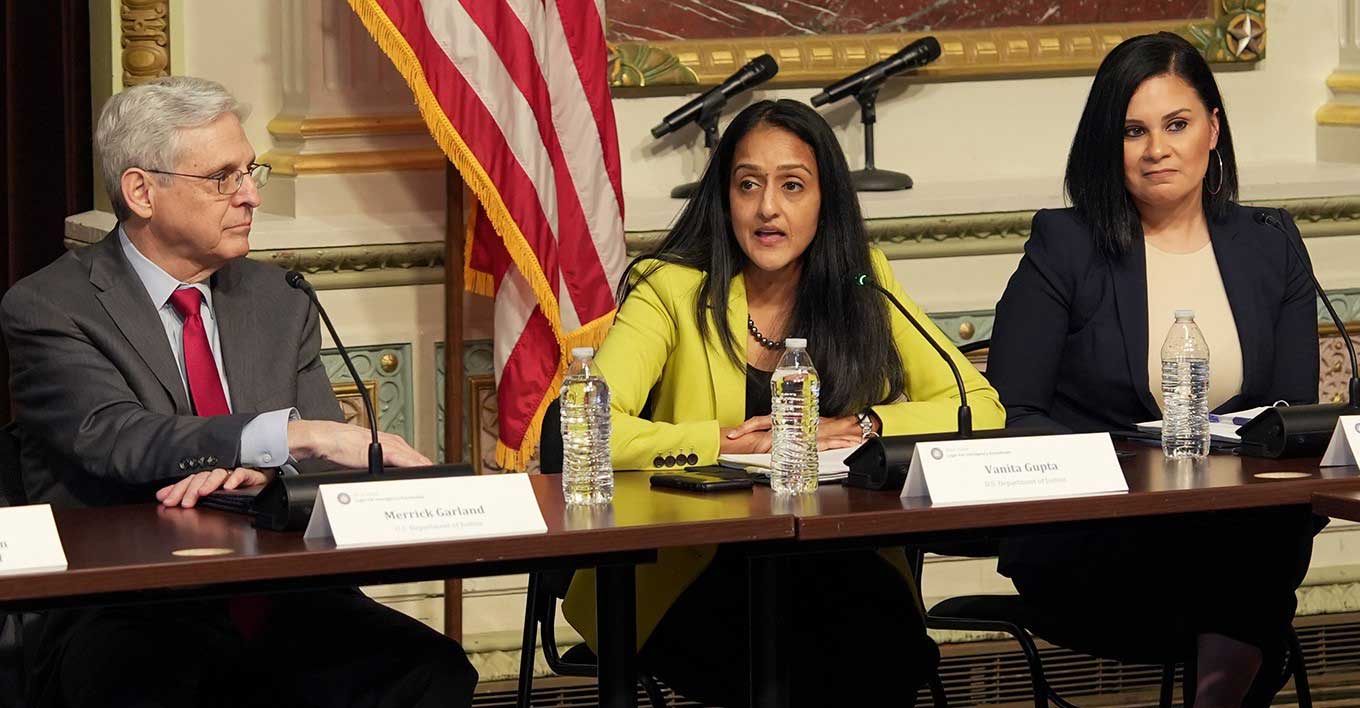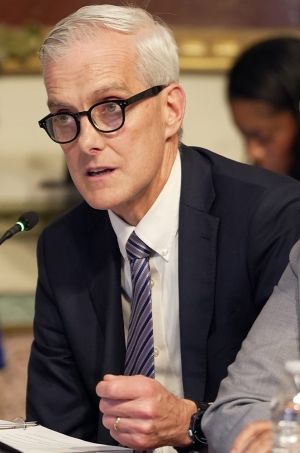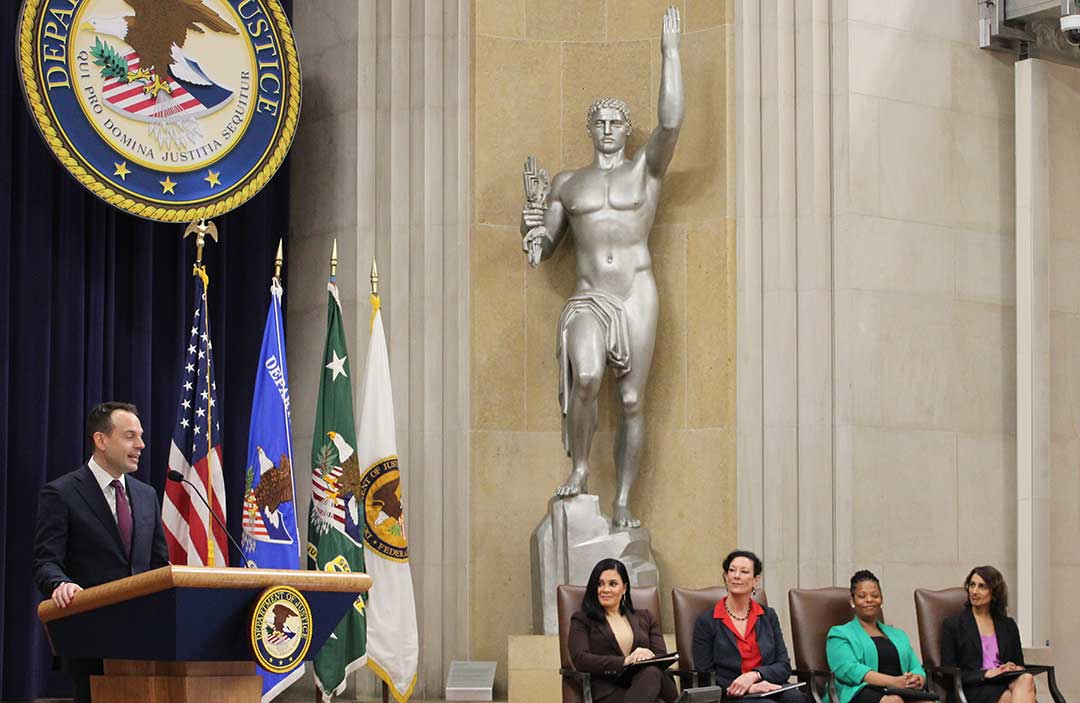Fact Sheet: Access to Justice is Access for Veterans
Why Access for Veterans is an Access to Justice Issue
The Department of Justice is committed to ensuring access to justice for Veterans and their families. As Attorney General Merrick Garland emphasized, “The Justice Department honors our nation’s Veterans and servicemembers not just with words but also with action.”
To help Veterans and their families meet their legal needs, in November 2021, Attorney General Garland directed the Office for Access to Justice (ATJ) to identify effective ways to promote access to justice in the civil and criminal legal systems, including through medical-legal partnerships, legal assistance clinics, Veterans Treatment Courts, and reentry programs and services.
How Legal Systems Impact Veterans
Veterans share many of the legal challenges faced by our civilian population, including evictions, unemployment, fraud, and family law disputes. They may also face challenges from the nature of their discharge as well as challenges to their mental and physical health because of their military service.
Civil Legal Challenges
-
In 2021, 76% of low-income Veteran households reported a civil legal problem, and 44% experienced at least five civil legal problems. [Endnote 1]
-
Low-income Veteran households did not receive any or enough legal help for 84% of their substantial civil legal problems in 2021. [Endnote 2]
-
Unaddressed legal problems can worsen the risks that Veterans face – from homelessness to incarceration and from joblessness to suicide. [Endnote 3]
-
Veterans from vulnerable and marginalized communities often face unique legal problems because of their race, ethnicity, gender, sexual orientation, or other status. [Endnote 4]
-
In 2021, 72% of homeless Veterans in emergency shelters, safe havens, or transitional housing programs reported having a disability. [Endnote 5]
-
Seven of the top ten unmet needs of homeless Veterans are legal issues: court fees and fines, credit issues, expungement of criminal records, child support, family law, discharge upgrade appeals, and tax issues. [Endnote 6]
Criminal Legal Challenges
-
One in three of the nation’s 19 million Veterans report having been arrested at least once in their lifetime, and an estimated 107,400 Veterans are incarcerated in state or federal facilities. [Endnote 7]
-
Veterans make up nearly 8% of the state prison population and almost 6% of the federal prison population. [Endnote 8]
-
Approximately a quarter of incarcerated Veterans have other-than-honorable or “bad conduct” discharges, which makes access to their earned benefits and care more difficult. [Endnote 9]
-
About 1 in 4 male Veterans in state prison (28%) and 1 in 5 (20%) in federal prison are combat Veterans. [Endnote 10]
-
Veterans with post-traumatic stress disorder (PTSD) are 61% more likely to have criminal justice involvement and Veterans with traumatic brain injury (TBI) are 59% more likely to experience criminal justice involvement. [Endnote 11]
-
About 30% of incarcerated Veterans have a history of homelessness. [Endnote 12]
How ATJ is Expanding Access to Justice for Veterans
Since its restoration in 2021, ATJ has been working to expand access to justice for Veterans, Servicemembers, and their families by:
- Prioritizing Veteran-centered engagement
- Collaborating with the Legal Aid Interagency Roundtable
- Promoting successful reentry for justice-involved Veterans
- Coordinating federal resources
- Mobilizing pro bono work

 Prioritizing Veteran-Centered Engagement
Prioritizing Veteran-Centered Engagement
ATJ is centering the voices of impacted communities and those leading access to justice solutions to ensure all efforts are people-centered. To understand the legal needs and perspectives of Veterans and their families, ATJ has engaged and consulted with Veterans, Veteran service organizations (VSO), Veteran advocates, legal service providers, Veteran legal clinics, VA medical-legal partnership staff, and federal, state, and local partners working to expand access to justice for Veterans.
-
In 2024, ATJ hosted a virtual briefing by the Veterans Benefits Administration for legal aid providers and Veterans on Veterans’ benefits. The briefing included a presentation on VBA programs and services, including those that provide disability compensation, education, vocational readiness, and employment, and a question and answer session for legal aid providers.
-
In November 2023, ATJ and the VA hosted a listening session with legal aid providers. Legal aid providers shared their experiences working with Veterans and discussed areas where simplification of forms and processes could expand Veterans’ access to VA resources. Providers also highlighted promising practices that are already helping Veterans.
-
In February 2023, ATJ partnered with SVI on a listening session with the Black Veteran community to hear about the legal issues they are facing, including accessing VA benefits, requesting discharge upgrades, and addressing housing concerns.
-
ATJ participated in a VA Hispanic Heritage Month celebration event in September 2023. During this virtual event, ATJ staff highlighted their work to support and expand legal assistance to Veterans and to promote language access for Veterans and family members with limited English proficiency.
ATJ is building expertise on the access to justice needs of Veterans across its workforce. ATJ has hired staff with strong expertise and backgrounds in legal services access and medical-legal partnerships for Veterans, and staff who are Veterans themselves, including a retired Senior Paralegal Noncommissioned Officer who completed 20 years of service with the U.S. Army.

 Collaborating with the White House Legal Aid Interagency Roundtable
Collaborating with the White House Legal Aid Interagency Roundtable


The Attorney General directed ATJ to promote access to justice across the federal government by mobilizing the expertise and resources of the over two dozen federal agencies that comprise the White House Legal Aid Interagency Roundtable (LAIR), in ATJ’s role to direct and staff LAIR’s work. The VA and the Department of Defense (DoD) have continued to serve as LAIR member-agencies since LAIR was reinvigorated in 2021, bringing critical perspective to LAIR’s collaboration.
-
The 2021 LAIR Report focused on barriers to access to justice that were exposed and exacerbated during the COVID-19 pandemic, and identified the innovative strategies adopted by federal agencies in response to the pandemic. One of the initiatives highlighted in the report was the VA’s use of supplemental American Rescue Plan Act (ARPA) funds to expand legal services to help Veterans and their families secure permanent housing and to prevent evictions and foreclosures.
-
The 2022 LAIR Report, Access to Justice through Simplification, focused on people-centered simplification of government forms, processes, and language. The report highlights the VA’s engagement with legal aid service providers to design two new legal services grant programs to help Veterans with their civil legal needs. In 2023, the VA awarded $11.5 million to 79 legal aid providers and other organizations to help Veterans experiencing, or at risk of experiencing, homelessness with their legal issues.
-
As noted in the 2023 LAIR Report, Access to Justice in Federal Administrative Proceedings: Nonlawyer Assistance and Other Strategies, the VA manages the accreditation of nonlawyers, such as representatives working for VA-recognized VSOs and claims agents. As of October 2023, over 7,700 people are accredited with the VA as VSO-representatives and nearly 500 as claim agents. Under the VA’s current initiative to expand access to culturally competent representation for American Indian and Alaska Native Veterans, two Tribal VSOs are newly recognized by the VA to assist Native American Veterans with their VA benefits claims.

 Promoting Successful Reentry for Justice-Involved Veterans
Promoting Successful Reentry for Justice-Involved Veterans
In April 2022, ATJ led the drafting and publication of the Reentry Coordination Council (RCC) report to Congress, Coordination to Reduce Barriers to Reentry: Lessons Learned from COVID-19 and Beyond.
-
The RCC is an interagency collaboration of seven federal agencies that developed recommendations to Congress on mitigating barriers to reentry for people leaving incarceration.
-
The RCC report highlights effective policies and innovative strategies to reduce barriers to successful reentry, including the VA’s use of virtual platforms and technology to expand services to incarcerated Veterans.
-
The report also recommends that the VA’s efforts in identifying and providing services to justice-involved Veterans be replicated to support other groups, such as American Indians and Alaska Natives as well as survivors of human trafficking.
ATJ hosted two Reentry Simulations, interactive educational experiences that illustrate the significant obstacles faced by individuals returning home from incarceration.
-
The Reentry Simulation was first held in 2022 for senior officials and staff at RCC member agencies, including the VA.
-
In 2024, ATJ co-hosted a second Reentry Simulation with the Federal Bureau of Prisons (BOP). Over 120 people engaged in an interactive experience to better understand the challenges faced by justice-impacted individuals reentering society, including barriers that justice-involved Veterans encounter.


 Coordinating Federal Resources
Coordinating Federal Resources
-
ATJ launched a partnership with the Justice Department’s Servicemembers and Veterans Initiative (SVI) and the Executive Office for U.S. Attorneys (EOUSA) to promote and support federal Veterans Treatment Courts (VTC) and reentry programs for Veterans.
-
ATJ partnered with SVI and EOUSA to host a roundtable in October 2022 for USAOs to share resources and guidance on VTCs and to learn how federal VTCs might be successfully modeled in other districts. Following the roundtable, ATJ provided information to USAOs on screening and assessment tools for VTCs, as well as copies of policy guidelines, handbooks, brochures, application forms, and participant agreements.
-
In November 2022, ATJ Director Rachel Rossi participated in a panel at the U.S. Attorneys Conference with Trina Higgins, U.S. Attorney for the District of Utah, and Jacqueline Romero, U.S. Attorney for the Eastern District of Pennsylvania. The panel discussed reentry generally and reentry courts specifically focused on Veterans, mental health, and tribal communities.
-
In 2022, ATJ, SVI, and EOUSA met with over 10 U.S. Attorneys’ Offices (USAO) that participate in, or have an interest in establishing, federal VTCs and reentry programs for Veterans. USAOs discussed the benefits and challenges of working with Veterans in federal diversion and reentry programs and identified creative and innovative VTC models.

 Mobilizing Pro Bono Work
Mobilizing Pro Bono Work
-
The Federal Government Pro Bono Program (Program) is housed in ATJ, and ATJ is expanding its resources for the first time in over twenty years. The Program screens pro bono opportunities and connects federal government attorneys with vetted pro bono work, including opportunities to assist Veterans. In October 2023, ATJ launched the DOJ Pro Bono Portal, an online platform which is streamlining and expanding access to pro bono work by providing DOJ attorneys around the country with notifications of pro bono activities in their states.
-
In November 2022, ATJ’s Federal Government Pro Bono Program partnered with the VA and SVI to host a virtual event for Veterans Day that featured a panel of attorneys working at VA medical-legal partnerships (MLPs). Approximately 250 federal government attorneys and paralegals participated in the event. Panelists spoke about Veterans’ civil legal needs and available pro bono opportunities for participants at VA MLPs.
-
In November 2023, ATJ conducted a webinar for federal attorneys to learn more about providing pro bono legal advice to Veterans, including a primer on a trauma-informed approach to pro bono work. Featuring remarks by ATJ Director Rachel Rossi, the presentation shared best practices for mindfully working with Veterans, including those who may have experienced trauma.
Citations
[Endnote 1] Legal Services Corporation, The Justice Gap: The Unmet Civil Needs of Low-Income Americans 10, 41 (April 2022). https://lsc-live.app.box.com/s/xl2v2uraiotbbzrhuwtjlgi0emp3myz1. About 1.6 million Veterans have household incomes below 125% of the federal poverty level. Id. at 10.
[Endnote 2] Id. at 55.
[Endnote 3] U.S. Dept’ of Justice, Memorandum for Heads of Department Components: Guarding the Rights of and Improving Access to Justice for Veterans, Servicemembers, and Military Families, at 2 (Nov. 10, 2021), https://www.justice.gov/opa/file/1175261-0/dl.
[Endnote 4] Legal Services Corporation, Report of the Veterans Task Force, at 24 (2021), https://www.lsc.gov/our-impact/publications/other-publications-and-reports/lsc-veterans-task-force-report.
[Endnote 5] U.S. Dep’t of Housing & Urban Development, 2021 Annual Homelessness Assessment Report (AHAR) to Congress, Part 2: Estimates of Homelessness in the United States, at A-12 (2023), https://www.huduser.gov/portal/sites/default/files/pdf/2021-AHAR-Part-2.pdf.
[Endnote 6] U.S. Dep’t of Veterans Affairs, Fact Sheet: Community Homelessness Assessment, Local Education and Networking Groups (CHALENG) (2022), https://www.va.gov/HOMELESS/docs/chaleng/CHALENG_2022_Fact_Sheet.pdf.
[Endnote 7] Council on Criminal Justice, Veterans Justice Commission, Honoring Service, Advancing Safety: Supporting Veterans From Arrest Through Sentencing, (2023), https://counciloncj.foleon.com/veterans-commission/vjc-reports/arrest-through-sentencing; U.S. Dep’t of Justice, Bureau of Justice Statistics, Survey of Prison Inmates, 2016 Veterans in Prison, at 1 (March 2021), https://bjs.ojp.gov/content/pub/pdf/vpspi16st.pdf.
[Endnote 8] Survey of Prison Inmates, 2016 Veterans in Prison, supra note 6, at 4; U.S. Dep’t of Justice, Bureau of Justice Statistics, Federal Prisoner Statistics Collected Under the First Step Act, at 4 (Feb. 2021), https://bjs.ojp.gov/content/pub/pdf/fpscfsa20.pdf.
[Endnote 9] Reentry Coordination Council, Coordination to Reduce Barriers to Reentry: Lessons Learned from COVID 19 and Beyond, at 12, n. 54 (April 2022), https://www.justice.gov/opa/pr/justice-department-releases-reentry-coordination-council-report-recommending-evidence-based. “Bad conduct” discharges include dishonorable, bad conduct, and other-than-honorable discharges. Id.
[Endnote 10] Survey of Prison Inmates, 2016 Veterans in Prison, supra note 6, at 1.
[Endnote 11] Ugur Orak, From Service to Sentencing: Unraveling Risk Factors for Criminal Justice Involvement Among U.S. Veterans (Oct. 23, 2023), https://counciloncj.org/from-service-to-sentencing-unraveling-risk-factors-for-criminal-justice-involvement-among-u-s-veterans/.
[Endnote 12] Jack Tsai et al., Homelessness in a National Sample of Incarcerated Veterans in State and Federal Prisons, Adm. Policy Ment. Health and Mental Health Services Research, 41(3), 360-367 (May 2014), https://doi.org/10.1007/s10488-013-0483-7.

 U.S. Department
of Justice
U.S. Department
of Justice